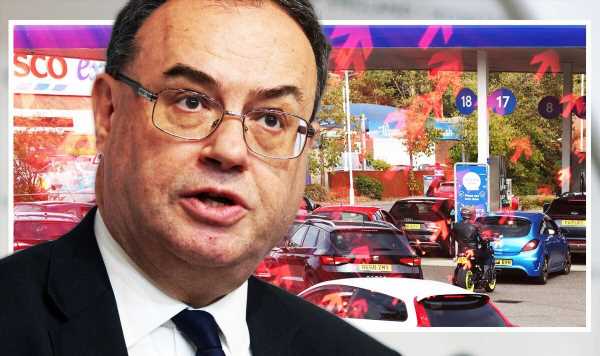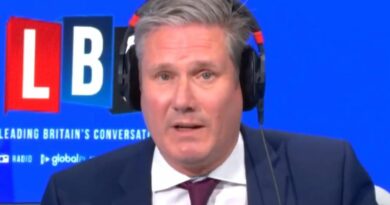Bank of England in deep trouble as ‘big sexy turtle’ Andrew Bailey has ‘lost the plot’
Cost of Living: Expert on Andrew Bailey’s comment
We use your sign-up to provide content in ways you’ve consented to and to improve our understanding of you. This may include adverts from us and 3rd parties based on our understanding. You can unsubscribe at any time. More info
UK inflation rose to nine percent in the 12 months to April, the Office for National Statistics (ONS) said last week. The rise in the Consumer Prices Index (CPI) – the measure of the changing prices of goods – is up from seven percent in March. This marks a 40-year-high for inflation, which is now at its highest level since March 1982, when it was 9.1 percent, according to the ONS.
The increase comes as millions of homes are now facing staggering increases in their energy bills after the price cap rose.
A worldwide rise in gas prices and Russia’s invasion of Ukraine have also contributed to rising fuel and food prices.
Amid the rise in inflation, the Bank of England and Governor Andrew Bailey have come under major criticism.
The Bank’s job is to keep prices stable – the Government asks it to keep inflation at two percent.
But amid the ongoing crisis, the Bank has been accused of being behind the curve in forecasting the rising inflation, which would have provided some relief for the economy had it come soon enough and allowed time for businesses to brace for the impact hitting the nations.
JUST IN: Brexit: UK to OVERRIDE parts of hated deal within weeks – EU told to ‘see logic’


The Bank, which waited until December 2021 to increase interest rates, has been roundly criticised for waiting when the data showed a spiralling crisis was inbound and threats of a recession loomed.
Mr Bailey – nicknamed “the big sexy turtle” by his predecessor Mark Carney after a Financial Times article compared his slow actions to those of the mating habits of a Galapagos tortoise – is now accused of having lost control of the Bank.
The inflation increase has seen Mr Bailey torn apart by a former member of the Bank’s nine-person monetary policy committee (MPC), which is chaired by the Governor.
David “Danny” Blanchflower claimed “Oxbridge group-think” now dominates the Bank’s decision-making.
The Economics professor, who called for interest rate cuts, also claimed the institution is being managed by a “clot”.

He told the Sunday Times: “Since September, Bailey has basically lost the plot.
“And there’s no [dissenting] voice within the MPC . . . Where is the debate?”
The economist’s sharp disapproval of the Bank’s response to inflation is part of a growing chorus of voices who are becoming increasingly angry at Mr Bailey.
Economist Gerard Lyons, who advised Boris Johnson as Mayor of London is among those levelling the blame at the embattled Governor.
He said: “I don’t think [Bailey’s] on top of the economics or macro-picture.
DON’T MISS:
‘Unilateral solutions won’t work’ US issues damning warning to UK over hated Brexit deal [LATEST]
Russia now facing ‘sudden and catastrophic defeat’ and Putin ‘will not survive’ [INSIGHT]
British expats in Spain rejected in illegal homes fight: ‘Like talking to a brick wall’ [ANALYSIS]

“I don’t think he has had enough experience of either seeing things from the market perspective or communicating with the market.”
Despite the criticism, those defending Mr Bailey may argue that the bank was caught off guard by circumstances outside of its control.
The war in Ukraine has played a part, as have increased energy demands in Europe and lower-than-expected Russian pipeline gas supplies.
A source told the Times that Mr Bailey, who is in the second year of his eight-year stint as Governor, faces an uphill battle over the next year and a half.
The insider, who is close to Mr Bailey, said: “It’s a difficult phase because there are difficult trade-offs.
“The Bank can’t make all the people happy all of the time.

“In fact, for the next 18 months, it’s likely to make most people unhappy most of the time.
“So being unpopular is what it’s going to have to be.”
However, the Governor’s popularity is unlikely to matter to the millions of families across the UK, who are feeling the pinch harder than richer households.
The poorest households actually faced inflation rates of 10.9 in the year to April, rather than nine percent, according to the Institute for Fiscal Studies.
The huge increases in the prices of goods for poorer families have coincided with a relatively paltry increase in benefits, according to the Institute’s Heidi Karjalainen.
She said: “State benefits only increased by 3.1 percent in April. This means big real terms cuts to the living standards of many of the poorest households.”
Source: Read Full Article


